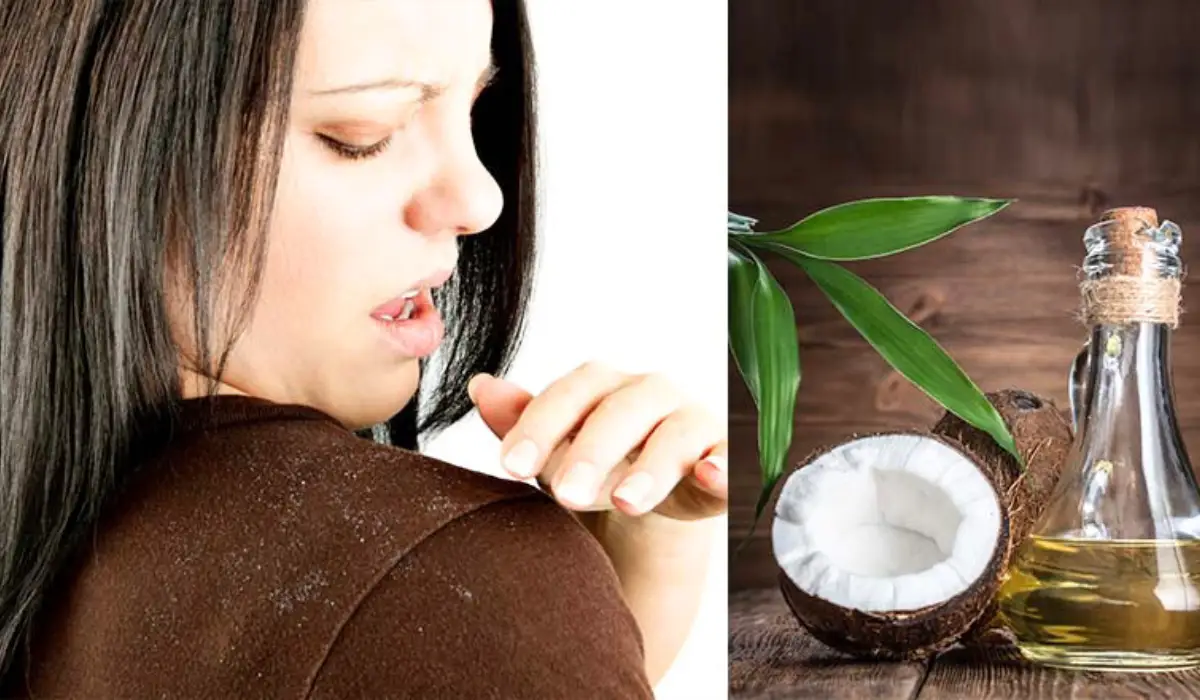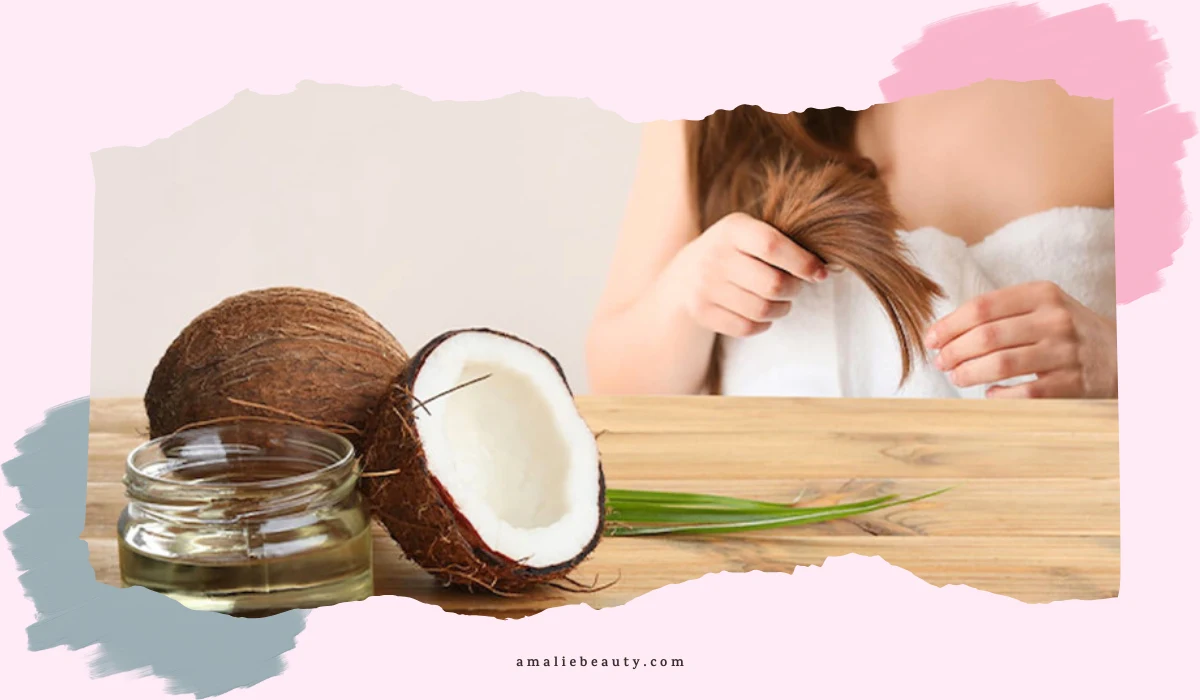Dandruff, a common scalp condition causing flaky skin and itching, can be a persistent concern for many. Amidst a plethora of remedies, coconut oil has emerged as a popular and natural solution. In this article, we delve into the question: Does coconut oil help with dandruff? Let’s explore the scientific evidence and traditional wisdom behind this remedy.
What is the root cause of dandruff?

Coconut oil may help dandruff if you understand its cause. Dandruff is often caused by excessive scalp Malassezia. Increased fungal growth promotes irritation and skin cell loss, causing flaky dandruff. Dandruff can result from oily skin, stress, and skin issues. Dandruff is caused by Malassezia’s scalp microbiome changes. Spreading this yeast-like fungus causes skin irritation and dandruff. Oily skin hosts Malassezia, exacerbating the issue. Stress can also induce immune system imbalances, which increase Malassezia and dandruff.
Dandruff can result from seborrheic dermatitis, psoriasis, and eczema. Skin factors that promote Malassezia growth increase dandruff irritation and flaking. Thus, understanding dandruff causes is crucial when using coconut oil.
Top Benefits of Coconut Oil
The Antifungal Properties of Coconut Oil:
Medium-chain fatty acids, especially lauric acid, make coconut oil antibacterial. Lauric acid is antifungal, making coconut oil a possible scalp Malassezia treatment, according to studies. This natural antifungal property makes coconut oil a possible dandruff therapy. Lauric acid, a saturated lipid in coconut oil, prevents Malassezia. Lauric acid, coconut oil’s major antimicrobial, kills pathogenic fungus by disrupting cell membranes.
Coconut oil applied to the scalp may minimize Malassezia overgrowth, controlling dandruff. A full remedy for dandruff is coconut oil. Coconut oil provides long-term treatment with lauric acid’s antifungal qualities. This antimicrobial property keeps Malassezia out to repair the scalp’s microbiome and remove dandruff. Coconut oil has many benefits, but its antifungal properties make it a promising natural dandruff cure.
Moisturizing the Scalp:
Coconut oil’s scalp-hydrating properties make it a popular dandruff treatment. Oil’s hydration may alleviate dandruff and dryness. The oil moisturizes the scalp, reducing dandruff’s flakiness and irritation. Coconut oil moisturizes with essential fatty acids. Coconut oil keeps the scalp hydrated. This therapy reduces dandruff and promotes scalp health.
Massage and Blood Circulation:
Gentle scalp massage with coconut oil is another factor. Massaging evenly distributes oil on the scalp and increases blood circulation. Improved blood flow may prevent dandruff by improving scalp health. Massaging actively eliminates dead skin, decreasing flaking. Hair massage with coconut oil is good. Gentle scalp massage ensures that the oil reaches every crevice, improving its efficacy in treating dandruff. Coconut oil’s moisturizing and nourishing benefits must be uniformly dispersed to improve scalp health. Massage improves blood circulation, preventing dandruff.
Dandruff is reduced by increased blood flow to the scalp, which supplies nutrients. Nutrition boosts scalp health, reducing Malassezia, the dandruff fungus. Peeling is reduced by massage-induced dead skin cell removal. Exfoliating dead cells with massage keeps the scalp healthy. A holistic scalp care and dandruff prevention treatment, massaging coconut oil stimulates blood circulation and eliminates dead skin cells. Adding this to your hair care routine may improve coconut oil and scalp health.
Potential Reduction of Inflammation:
Dandruff is inflammatory like many skin conditions. Coconut oil may reduce inflammation due to its polyphenol and antioxidant content. These bioactive ingredients relieve scalp itching and promote dandruff recovery. Coconut oil contains anti-inflammatory polyphenols. Natural substances affect cellular inflammatory response to control dandruff-causing immunological pathways.
Polyphenols ease dandruff and inhibit inflammation, enhancing scalp health. Antioxidants make coconut oil anti-inflammatory. Antioxidants reduce inflammation-causing oxidative stress. Coconut oil antioxidants reduce scalp irritation and promote recovery by protecting against free radicals and oxidative damage.
Application Techniques and Timing
Coconut oil can help dandruff depending on application. Warm and carefully massage coconut oil into the scalp for full coverage. Distribution must be equal to maximize oil benefits. Overnight oiling may enter the scalp more.
First, it liquifies oil for easier application and absorption. Second, warmth enhances massage’s calming and healing effects. Oil is uniformly distributed and blood circulation is improved by massaging the scalp. For best results, some keep coconut oil on their scalp overnight. Long-term use enables oil into the scalp, possibly treating dandruff. Coconut oil can balance the scalp overnight by moisturizing and nourishing. The full advantages of coconut oil for dandruff depend on consistency. Consistent use improves results. Coconut oil reduces dandruff by treating its causes and symptoms.
Complementary Treatments and Lifestyle Factors
Coconut oil may assist, but dandruff is complicated. Effective management involves multiple approaches. Diet, stress, and hygiene affect dandruff. Stress weakens the immune system, aggravating scalp problems and dandruff. Coconut oil and stress-reduction methods like meditation or exercise can help control dandruff holistically. Balanced, nutrient-rich diets boost scalp health.
Dandruff may be managed with skin-healthy vitamins and minerals. Integrating coconut oil into your diet can help your scalp. A diversified strategy may help treat dandruff. Dandruff can be managed and prevented with lifestyle changes, additional treatments, and coconut oil hair care. Thus, multidimensional dandruff comprehension allows for more sophisticated and effective care.
Potential Considerations and Allergies
Coconut oil may reduce dandruff, however side effects and allergies should be considered. Many people tolerate coconut oil, although sensitivities vary. Before using coconut oil, patch tests should assess skin sensitivity. Occasionally, coconut oil allergies occur. Some people may have skin discomfort or allergies to coconut oil. Those with coconut allergies or a history of adverse reactions should consult a doctor before using coconut oil for scalp care. Allergic reactions to coconut oil require urgent discontinuation. It’s vital to separate allergic reactions from other irritations.
Dermatologists can explain skin concerns and recommend treatments. Eczema and psoriasis sufferers should use coconut oil cautiously. Coconut oil may assist or hurt. Ensure coconut oil’s compatibility with skin conditions with professional help to avoid negative effects. Skin types matter too. Comedogenic coconut oil may not suit oily or acne-prone skin. Choose oils by skin type to optimize benefits and limit adverse effects. Coconut oil may reduce dandruff, however side effects and allergies should be considered. Patch testing is recommended for allergy and sensitive skin sufferers. Healthcare professionals recommend a safe approach to utilizing coconut oil.
Conclusion
In conclusion, using coconut oil’s natural antifungal, hydrating, and anti-inflammatory characteristics can be an effective way to treat dandruff. To reap the most benefits, combine coconut oil with other therapeutic procedures and incorporate it into your daily hair care routine. Coconut oil, when applied properly, has the potential to remove dandruff and create a healthy scalp.

